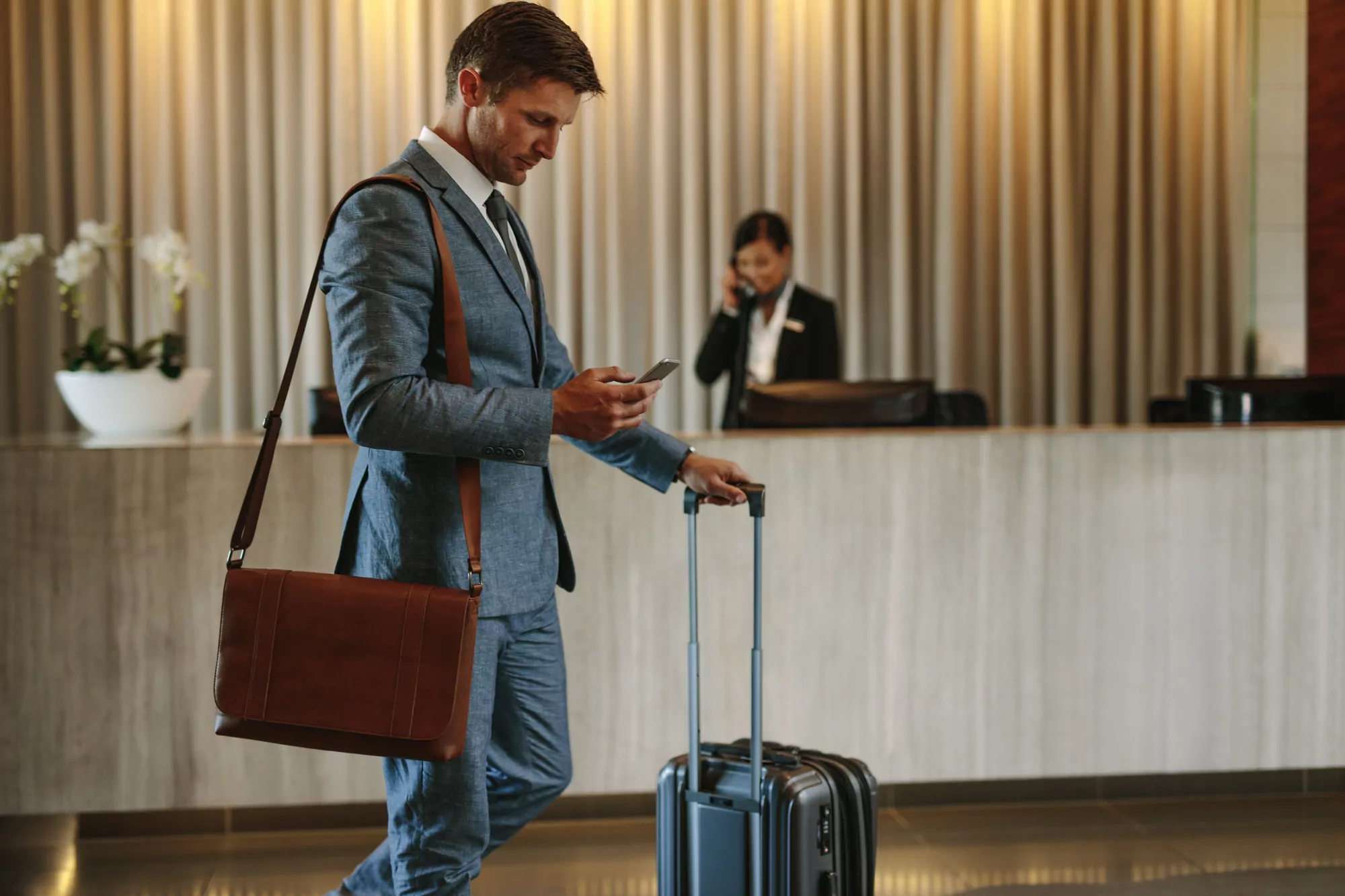There’s a lot to think about when traveling for business, so it’s understandable that personal safety and security aren’t always top of mind. These simple hotel safety tips for business travelers can be enacted every time you travel for business to ensure you remain safe.
Research the Hotel
If you’re a corporate traveler in charge of booking your own accommodations and transportation, get a quick overview of the area to help determine if your hotel is in a safe location. Look into how close the police station and hospital are. You might also look into local crime statistics to determine whether the hotel is in a higher or lower crime area. Use an online tool like Google Maps Street View to get a feel for the area surrounding the hotel beforehand. If you help manage your company’s travel program, make sure hotel safety is at the top of the checklist when choosing accommodations for corporate travelers.
Be Mindful About Where You Park
Car theft in hotel parking lots is a significant problem in a number of US regions. Take advantage of paid parking garages where they are available. Hotel guests can often use them for free. Where parking is outdoors, aim to park within eyesight of your room. When that’s not possible, position your vehicle under a streetlight. Many hotels keep their parking lots well lit.
Don’t Keep Valuables in the Car
Valuables should generally be left at home while on business trips. If there are valuables like technology you must travel with for your job or another important reason, think twice before locking them in your car. While it may be convenient, you risk having items stolen. If there are items you must keep in your car, make sure they are placed in your trunk or covered in the backseat of your locked car.
Don’t Share Personal Information
While business travel such as trade shows or annual company meetings can be a great way to connect with peers, you’ll want to keep personal information private even among those you have met online or aren’t meeting for the first time. Details like your hotel name, room number, room key, and travel itinerary should be kept private.
Meet New Connections in Public Spaces
If you decide to entertain a new friend or prospect while on your business trip, do so in an open, public area. Don’t invite them to your room or travel to theirs unless you feel totally comfortable. Restaurants, bars, parks, and entertainment venues during daylight hours offer the most protection.
Lock Up Your Luggage
This may be obvious at the airport but using a lock when you’re staying at the hotel is also useful for personal safety and peace of mind. Veteran business travelers are likely aware of TSA rules regarding luggage locks but if you’re not, check them out on the TSA’s official website. Locks ensure your ID and laptop as well as other valuables are secure.
Avoid Rooms by the Elevator
Elevators are a source of a lot of foot traffic and potentially raise the risk that someone wanders toward your door uninvited. Rooms away from these high traffic areas also tend to be quieter!
Avoid Rooms on the Ground Floor
One timeless hotel room safety tip dictates that guests should avoid ground floor rooms when possible for reasons of personal safety and privacy. Conventional wisdom states that first floor rooms are less safe because they are exposed to foot traffic from the hotel lobby. Higher floors are likely to have a lower volume of outside foot traffic.
Use the Hotel Room Safe
There’s really very little reason not to use in-room safes for valuables, yet only some do so regularly. Get peace of mind in case guests visit your room or someone gains illicit access. Choose a four-number password for your hotel safe that you can remember but will not be easily guessed, such as “1, 2, 3, 4” or four of the same number.
Leave Valuables at Home
Some items are too valuable to bring with you, even if you lock them in the hotel safe. If you travel frequently or stay in hotel rooms for long periods, it might be necessary to take some valuable items with you. An item of sentiment or luxury can be a welcome comfort and alleviate homesickness. But before packing anything of personal value, consider the best ways to protect those items. If you’re not confident these special objects can be kept safe, leave them at home or use the in-room safe to lock them away.
Check the Room Upon Arrival
Safety often means anticipating the unexpected and taking extra precautions. It can mean the protection of your physical well-being but it can also refer to your privacy. It doesn’t hurt to give the hotel room a quick scan before you settle into your room. Instances of secret cameras hidden in bathrooms, wall hangings, and mirrors have been documented. Also check that smoke detectors are working properly.
Know the Hotel’s Fire Escape Plan
Ask for a room located by the nearest fire exit and know the hotel’s fire escape plan to prepare for an emergency. A room close to the stairs can also help if another emergency were to occur, such as a weather event or power outage that requires you to evacuate the hotel premises via emergency exits.
Make it Look Like You Are In The Room
Leave the TV on, the curtains closed, the Do Not Disturb sign on the door, and the lights on to make it appear that you are in the hotel room, even when you are not. Thieves and other malicious actors will be less likely to attempt to enter the room if they suspect you might be in it.
Use a VPN
If you work for a company that values the security of sensitive and proprietary information, you may already use a VPN when connected to public internet like a hotel’s WiFi. VPNs route your internet traffic through a private, secure server, lowering the risk of your company’s data being stolen. But VPNs can also help protect personal data like bank account numbers and search histories and prevent outside access to personal files.
Secure the Door
A common hotel room safety hack includes carrying your own rubber door stop and placing it behind the hotel room door. If someone gains unexpected access to your room, the rubber door stopper adds an extra layer of security and is almost impossible to move, even when heavy force is applied to it. Or, try a portable door lock at the hotel for added business travel safety.
Befriend Hotel Staff
The clerk working the hotel’s front desk is your lifeline. Hotel staff are only a phone call away and will probably know where the safest local areas are to shop, eat, and spend your downtime while on your business trip.


